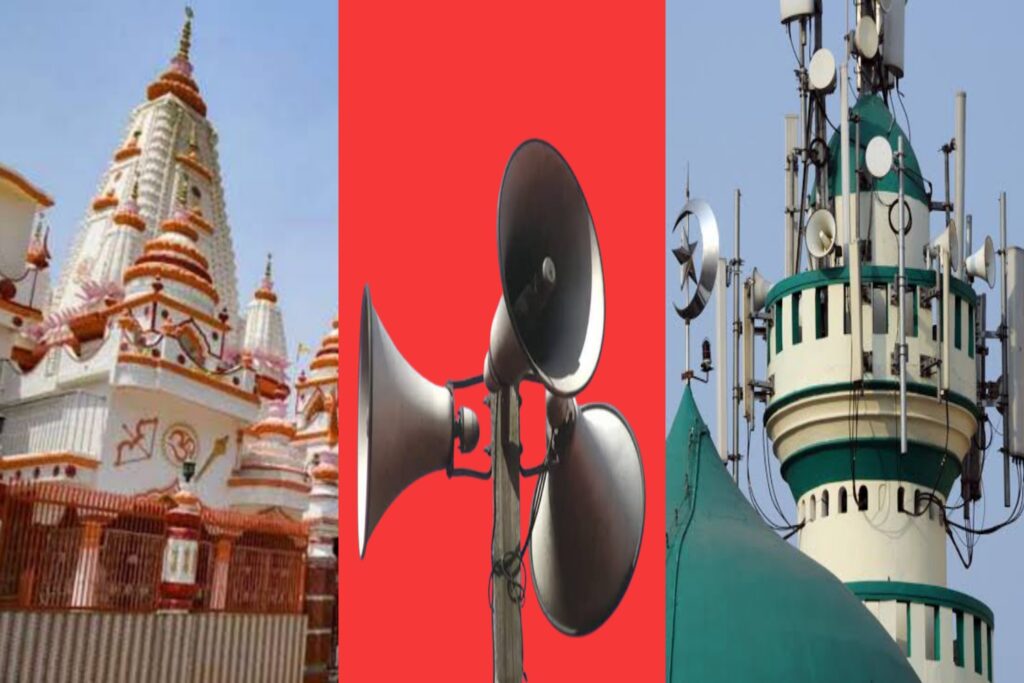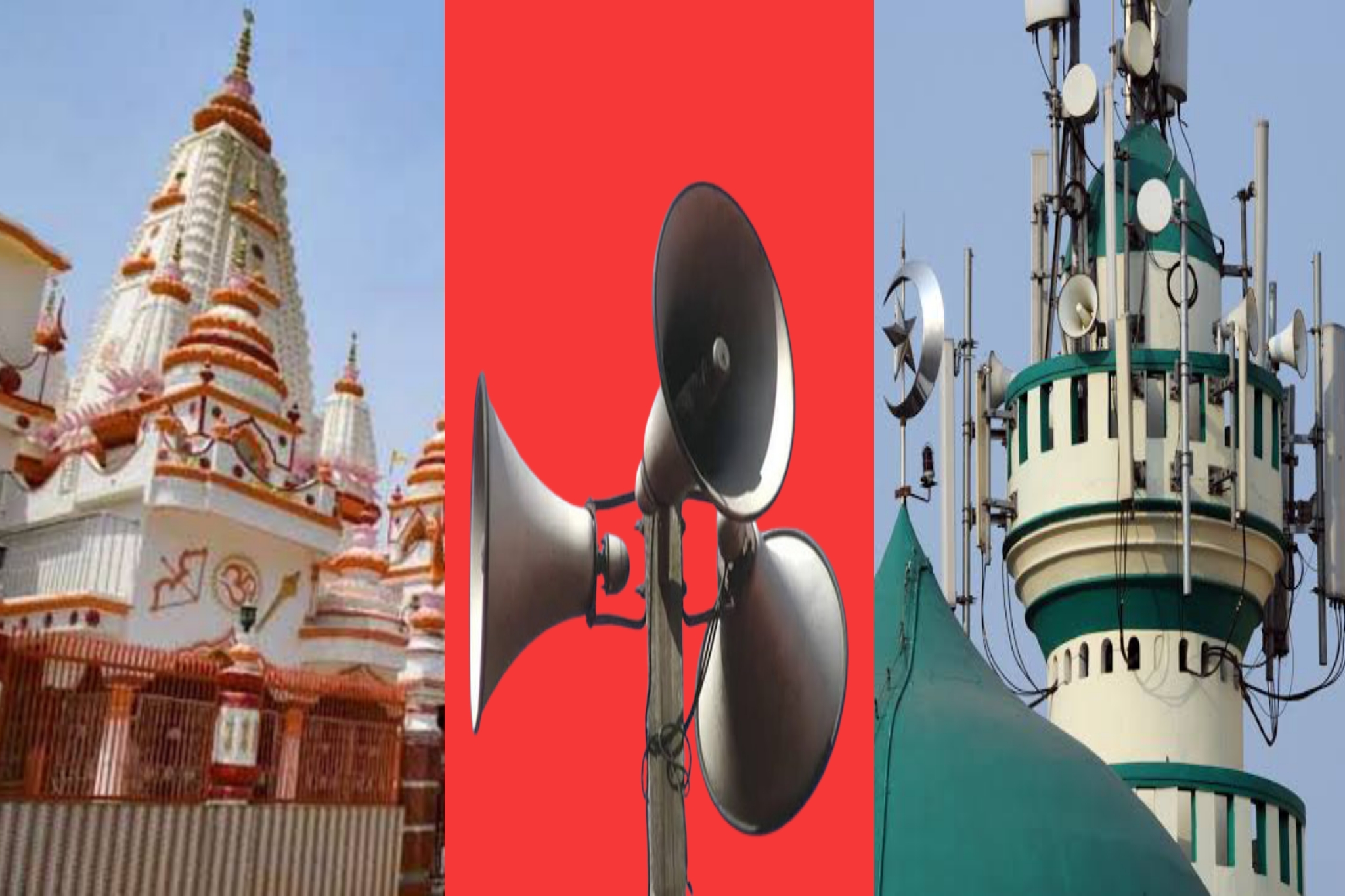
Time has come
In recent years, the issue of noise pollution has gained considerable attention due to its widespread impact on public health and societal well-being. Among the various sources contributing to this growing problem, the use of loudspeakers for broadcasting religious programs stands out as a particularly contentious issue. While religious practices hold a sacred place in Indian society, the unchecked use of loudspeakers for religious broadcasts has sparked debates about the balance between freedom of religious expression and the right to a peaceful environment.
The time has come to critically examine this practice and consider the need for a complete ban on broadcasting religious programs on loudspeakers across India. Such a measure is crucial not only for the protection against noise pollution but also for the promotion of education, peaceful coexistence, and the creation of an advanced society.
The Pervasive Issue of Noise Pollution
Noise pollution, often referred to as environmental noise, has been recognized as a major environmental problem, particularly in urban and semi-urban areas. It encompasses unwanted or harmful sounds that can interfere with normal activities such as sleeping, conversation, and learning. In India, where population density is high and urbanization is rapid, noise pollution has become a severe issue, affecting millions of people daily.
One of the most significant contributors to noise pollution is the use of loudspeakers during religious events, ceremonies, and rituals. While the intent behind using loudspeakers is often to reach a larger audience, the reality is that these broadcasts frequently infringe upon the peace and tranquility of entire neighborhoods. In many cases, these events take place early in the morning or late at night, disrupting sleep and creating an environment of constant disturbance.
The Impact on Education
The adverse effects of noise pollution on education are particularly concerning. For students, a conducive learning environment is essential for concentration, comprehension, and academic success. Educational institutions such as schools and colleges require a quiet atmosphere to facilitate effective teaching and learning. However, the pervasive use of loudspeakers for religious programs, particularly in rural and semi-urban areas, poses a significant barrier to achieving this.
One such practice is the use of loudspeakers for broadcasting religious programs, such as Shiva Charcha in the Hindu community and the five-times-a-day call to prayer (Namaz) in the Muslim community. These practices, while rooted in tradition and religious observance, have increasingly become a source of noise pollution, affecting the educational environment, disrupting daily life, and impeding the creation of an advanced society.
Teachers, too, are affected by this disruption. The ability to deliver lessons effectively is compromised when external noise intrudes into the classroom. This not only hampers the learning process but also places additional strain on educators who must work harder to maintain students’ attention and engagement.
The Right to Peaceful Living
Beyond the educational sphere, the right to a peaceful living environment is a fundamental human right that is often overlooked in the context of religious freedom. While the Indian Constitution guarantees the right to freely practice and propagate one’s religion, it also enshrines the right to life and personal liberty, which includes the right to live in a healthy and peaceful environment.
The use of loudspeakers for religious broadcasts, particularly when it is imposed on unwilling listeners, infringes upon this right. It is important to recognize that religious practices, while deeply personal and significant, should not come at the cost of others’ well-being. The noise generated by loudspeakers can lead to stress, anxiety, sleep disturbances, and even long-term health issues such as hearing loss and cardiovascular problems.
The Legal Framework and Public Sentiment
India has a legal framework in place to address noise pollution, including the Noise Pollution (Regulation and Control) Rules, 2000. These rules set permissible noise levels for different areas and times of the day, with specific provisions for the use of loudspeakers. However, enforcement of these regulations is often lax, particularly in rural and semi-urban areas where religious and community pressures can outweigh legal considerations.
Public sentiment on the issue is divided. While many people recognize the harmful effects of noise pollution, there is also a strong cultural and religious attachment to the use of loudspeakers in religious practices. This creates a complex dynamic where any attempt to regulate or ban the practice is met with resistance from certain sections of society.
However, there is a growing awareness among the educated and urban populace about the need to curb noise pollution for the greater good. Many people are beginning to advocate for a more balanced approach, where religious practices can continue without infringing on the rights of others. This shift in public sentiment is crucial for building momentum towards stricter enforcement of noise pollution regulations and, ultimately, a complete ban on the use of loudspeakers for religious broadcasts.
The Case for a Ban on Loudspeakers in Religious Broadcasts
Given the detrimental impact of loudspeaker use on public health, education, and peaceful living, there is a strong case to be made for a complete ban on the practice. Such a ban would not only help reduce noise pollution but also encourage more thoughtful and considerate forms of religious expression that respect the rights of all members of society.
The benefits of such a ban would be manifold. Firstly, it would create a quieter and more peaceful environment, particularly in residential and educational areas. This, in turn, would improve the quality of life for millions of people, reduce stress and health-related issues, and create a more conducive atmosphere for learning and personal development.
Secondly, a ban would encourage the use of alternative methods of communication that are less intrusive. For example, religious organizations could use modern technology such as online streaming, mobile apps, and social media to reach their followers without disturbing the broader community. This would allow for the continued practice and propagation of religion in a manner that is more in line with contemporary societal norms and expectations.
Lastly, a ban would send a strong message about the importance of respecting the rights of others and the need for responsible behavior in public spaces. It would reinforce the idea that religious freedom does not mean the freedom to infringe upon the rights of others, and that a truly advanced society is one where all members can coexist peacefully and harmoniously.
Counter-arguments
It is important to address some of the common counterarguments to a ban on loudspeakers in religious broadcasts. One of the main arguments is that such a ban would infringe upon religious freedom and the right to practice one’s faith openly. While this is a valid concern, it is important to remember that religious freedom is not absolute and must be balanced with other rights, such as the right to a peaceful environment and the right to education.
Moreover, religious practices can still be carried out without the use of loudspeakers. In fact, many religious traditions emphasize the importance of inner reflection and personal connection with the divine, which can be achieved without the need for public broadcasts. By encouraging more private and contemplative forms of worship, a ban on loudspeakers could actually enhance the spiritual experience for many people.
Another argument is that loudspeakers are necessary to ensure that everyone in the community can participate in religious events, particularly in large gatherings. However, with the advent of modern communication technologies, there are numerous alternative ways to reach a large audience without causing disruption to others. For example, events can be live-streamed online, allowing people to participate from the comfort of their homes.
Shiva Charcha
To further illustrate the impact of loudspeaker use in religious broadcasts, it is useful to consider specific examples such as “Shiva Charcha” in villages and small towns. Shiva Charcha is a form of religious discourse and worship dedicated to Lord Shiva, which often involves singing, chanting, and the use of loudspeakers to amplify the sound. While these events are important cultural and religious gatherings, their impact on the surrounding community can be significant.
In many cases, Shiva Charcha events are held in close proximity to schools, colleges, and residential areas. The loud and continuous noise generated by these events can disrupt the daily lives of students, teachers, and residents. For students, the noise can interfere with their ability to study and concentrate, particularly during exam periods. Teachers may struggle to maintain a conducive learning environment in the classroom, and residents may experience sleep disturbances and increased stress levels.
Moreover, the repetitive nature of these events, often held several times a week or even daily during certain periods, means that the disruption is not a one-time occurrence but a constant intrusion into the lives of those affected. The practice of “Shiv Charcha” (conversations on Shiva) has become popular in many villages and small towns of India in recent years. It has become a headache for students and for those involved in education and contemplation of all kinds. These religious gatherings, which often involve loud chanting, music and sermons broadcast over loudspeakers, can last for hours and are often held near schools and residential areas.
The constant noise generated by such events makes it difficult for students to concentrate on their studies, leading to poor academic performance and increased stress levels. No one can even convince the people who organize such events to play at a lower volume. They are usually illiterate or deliberately trying to provoke or mislead the uninformed. This creates a sense of helplessness and frustration among community members, who may feel that their concerns are being ignored in favor of religious practices.
The Role of Government and Community Leaders
The implementation of a ban on loudspeakers for religious broadcasts will require strong leadership and a coordinated effort from both the government and community leaders. The government must take a firm stance on the issue, enforcing existing noise pollution regulations and introducing new legislation if necessary to address the specific issue of loudspeakers in religious broadcasts.
Community leaders, including religious leaders, have a crucial role to play in fostering a culture of responsibility and respect for others. By advocating for more considerate forms of worship and leading by example, they can help shift public attitudes towards the use of loudspeakers and promote a more peaceful and harmonious society.
Also Read: A Double Attack on Reservation: Mallikarjun Kharge
The time has come for India to take decisive action to address the issue of noise pollution caused by loudspeakers in religious broadcasts. A complete ban on this practice is necessary to protect public health, promote education, and create a more peaceful and advanced society. While the challenge of balancing religious freedom with the rights of others is not an easy one, it is essential for the well-being of all members of society.
By embracing modern communication technologies and encouraging more private forms of worship, religious practices can continue to thrive without infringing on the rights of others. It is only through such thoughtful and responsible actions that we can build a society that is truly inclusive, respectful, and advanced.

